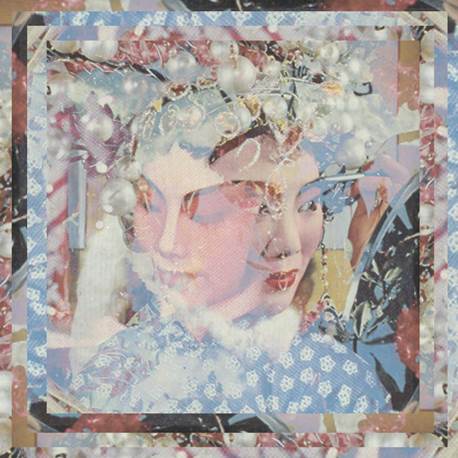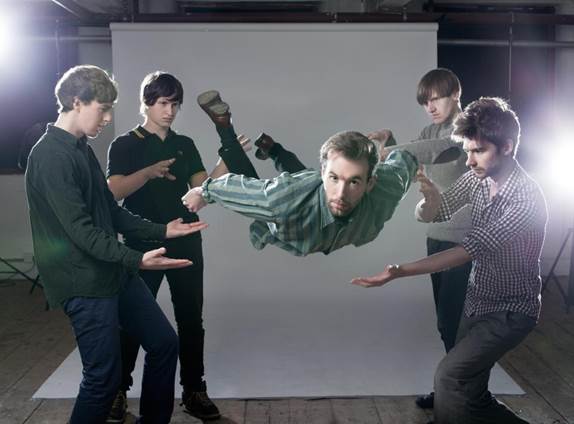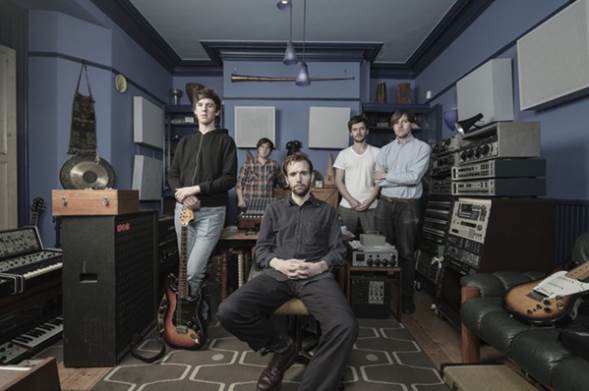I’ve long abandoned most modern and pop music labels, thinking of them as nothing more than marketing teams testing clever ways to sell products to people with little understanding musical evolution. In the broadest sense, general terms like Indie Rock are perfectly acceptable provided that critics don’t simply slather additional meaningless labels on top of that in vain attempts to describe a particular sound. In many regards, these labels have their benefits, but in a world of sonic sameness, labels rob the listener of potential experiences — as is the case with the Dutch Uncles.
Labelled as ‘math rock’ (amongst other silly labels) in a feverish attempt to describe the Dutch Uncle’s absolute sense of metronomic perfection, it’s a label that falls well short of adequately describing their fantastic sound. Whilst even some of Dutch Uncles’s band mates refer to their music as ‘math rock’, many listeners will simply have no context for the description, and eventually anything with a polyrhythmic beat might become ‘math rock.’ But enough with the editorial.
Dutch Uncles are the Marple-based band with distinctly good taste in music, and where Manchester is long known for its bands, this band stands out some significant ways. They are the first band in a long time to successfully draw on a wide musical heritage and deliver a unique and quite fantastic synthesis out of all it. Speaking of heritage, I can’t recall another band that combines inspirations and influences from such luminaries as Talking Heads, XTC, King Crimson, WIRE, Kate Bush, and Prince, and the mixes them with modern minimalist or classical composers such as Reich, Adams, and Stravinsky, amongst others.
So what is the Dutch Uncles sound? Purely from a musical perspective, I’d call it chamber rock — the perfect confluence of rock and highly polyrhythmic pop sounds with doses of applied classical form and theory across a diverse instrumental base. Did I mention the Steven Reich influence? Their music features loads of tension and resolution, a roulette wheel of time signatures and changing meters, and instrumentation that combines anything from choral style vocals, marimbas to fuzzed guitars and string quartets — yeah, that’s the stuff. It should be noted that the band’s fine bass player, Robin Richards, is also the band’s prime composer and arranger. Yes, he actually scores the music for the band. Suffice to say that Dutch Uncles is the kind of music group that classical musicians wish they could play in and that many young rockers aspire to.
Following up on their brilliant second album, Cadenza, their new album Out of Touch In the Wild is a hugely mature step for this band compositionally, thematically, and sonically. Rich, complex and ultimately rewarding even for the casual music listener, the band weaves enough potential pop hits into this dark beauty to keep us listening from end to end.
One of the larger achievements of this new album is that it telegraphs genuine emotions on many of the tracks with a sound that is more soulful, searching, and empathetic than anything previous. Where Cadenza was replete with sonic beauty, its emotive content was far more esoteric in nature. Not so with Out Of Touch In The Wild. It would be easy to simply attribute this emotive effect to Duncan Wallis’s expressive vocal styling, especially on ‘Godboy’, but the truth is that this album is such a tightly crafted work that it creates an environment in which darker emotions come to life naturally within the compositions. More importantly, the instrumentation so densely layered on this album that sounds dovetail neatly into another, giving it a much greater depth that previously achieved on the first two albums. The production is quite good.
And what’s this album about, you ask? Obviously, it’s about sex, drugs, and rock and roll — all from a focus on various human addictions and their direct consequences. The first track, ‘Pondage’, is slow building prologue that creates an elegant sense of urgency, longing, and unresolved tension — one that sets the mood for the entire album.
It also changes any previous notion of the Dutch Uncles as a guitar-based band. The second track, ‘Bellio’, immediately flexes it instrumentation muscles, delivering a huge pop rock sound in which contrapuntal keyboards and bass notes bounce off each other whilst bigger synth sounds fly overhead.
‘Fester’ is return to more of familiar Dutch Uncles sound, but cuts straight to a new level of compositional maturity, supporting the subject of darker interpersonal relationships through an ever more edgy soundscape.
Next up is ‘Godboy’, which is undoubtedly one of the strongest compositions on the album delivering an epic quality sound to a to a much sadder song dealing with the end of a drug addiction. Duncan Wallis’s voice presents as a fully mature narrative instrument on top of this beautifully orchestrated and performed song. Perhaps the greatest trick emotionally on this album is found in the song’s bridge, which builds with dynamic tension and then dissolves into a softly lilting and passage — one that fashions an oddly gentle and bittersweet mood via strings, atmospheric electronics, gently strummed guitar chords, and layered vocal treatments. The effect is profound.
‘Flexxin’’ is likely to be a big hit on the album due in no small part to Duncan’s signature dance video and Andy Proudfoot’s superb drum work. Just watch and you’ll see what I mean. Once again, tighter compositions and more varied instrumentation create an infectious synth and chamber string sound that will likely serve the band in the future. Duncan credits the inspiration of the measured string elements on this song to Kate Bush’s Hounds of Love — a sound that is evident elsewhere on this album.
Zug Zwang and Phaedra are two deeper cuts on this album that seem to get lost amidst the larger compositions, but I have to strongly urge listeners not to overlook the beautiful sounds in each. There are times when I listen to this band that it’s evident to me there’s a much larger potential in their music — bordering on the symphonic. Maybe someday we’ll get to hear this as well. It’s no stretch to think of this band composing and performing a killer cinematic score or West End production.
Where this release doesn’t quite have the same power of Cadenza and is missing some of Messrs Spedding’s and Broadhead’s bigger guitar sounds (as on ‘X-O’ or ‘Dressage’), this album has something more important going for it, namely cohesion. Connected compositionally, thematically and instrumentally, each song has a real sense of belonging — no mean feat for any modern band. Whilst ‘Nemeto’ gives hints of the older sound, what we get back in exchange for a less guitar throughout the entire release is the evolution of an already brilliant band. In particular ‘Threads’ gives us the band in its most elevated form. The intro features an entrancing bass, drums and marimba sequence with Peter Broadhead shifting his talents to the mallets. On top of this Sped Spedding unleashes some monstrous guitar frippery.
The album closes with a funky pulsating ‘Brio’, featuring a chopping string quartet, harpsichord-like keys, 80s electronic toms and bass synth lines, and a sustained ebow guitar effect. Chamber rock indeed. It’s a beautiful thing that modern pop music is evolving beyond traditional rock and roll forms, and the Dutch Uncles are a principle practitioner in this form, and I can’t recommend this album enough. With any luck or careful funding, we’ll likely be treated to a US tour before too long. This highly talented band are not to be missed.





